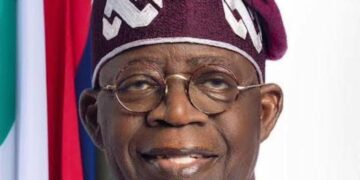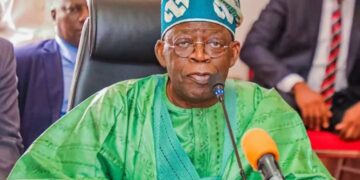Finance Minister, Wale Edun and Central Bank Governor, Olayemi Cardoso have affirmed that President Bola Tinubu’s economic reforms have successfully restored investor confidence in Nigeria’s economy and stabilized the foreign exchange (FX) market.
The officials delivered this optimistic assessment during a joint press briefing on the final day of the 2025 IMF/World Bank Spring Meetings in Washington D.C., where they projected a strong economic outlook for Nigeria.
They pointed to significant macroeconomic reforms that have bolstered investor trust, expressing confidence in achieving an ambitious seven per cent growth target.
Edun emphasized that key economic indicators are now moving in the right direction, marking a decisive shift from the unstable conditions of previous years.
Edun said: “Nigeria’s reform efforts are strongly appreciated by the international community as the most credible way to economic prosperity. In fact, the US State Department described Nigeria’s reforms as an economic miracle.
“Nigeria is economically, financially, in a much better place than it was just a couple of years ago. Inflation is coming down; the exchange rate is stabilising; food prices are easing, and the fundamentals are much stronger,” Edun said.
However, he noted that growth must be accelerated to lift millions of Nigerians out of poverty.
“Unless we get to about seven per cent growth, we are not going to substantially reduce poverty and improve the life of Nigerians. That is the target and commitment of this administration.”
He noted that currently, Nigeria’s economy was growing at an average of 3.4 per cent in 2024, with the most recent quarterly figure recorded at 3.84 per cent.
Edun outlined key strategies to bridge the growth gap, including boosting agricultural productivity, expanding digital infrastructure, supporting entrepreneurship, and enhancing access to finance across all sectors.
Tinubu’s administration, he revealed, was also pivoting away from dependence on concessional and commercial external funding towards aggressive domestic revenue mobilisation.
“The objective is to create jobs locally, empower youths, and support them through essential infrastructure.
“The focus now is on domestic revenue mobilisation.
“The focus is on crowding in the private sector so that they can come in and invest across the board: infrastructure, digital, toll roads.”
He explained that the imminent passage of key tax reform bills would significantly increase Nigeria’s tax-to-GDP ratio, improving the federal government’s revenue base.
“They can probably tell you better than I, but I think the imminent passing of that tax reform bill is on the horizon, and once it is passed, it does have in it the potential for increasing tax revenues that are earned by the government,” Edun said.
The minister stressed that the private sector must be the engine of sustained growth and job creation.
According to him, with macroeconomic stability returning and investor confidence rebounding, Nigeria appears poised, if reforms stay on course, to realise its long-elusive dream of inclusive, broad-based prosperity.
“We have turned the corner. It is now time for every Nigerian to contribute towards building a stronger, more prosperous economy,” Edun added.
On his part, Cardoso noted that the reforms undertaken in the last 18 months, have strengthened monetary buffers and stabilised the foreign exchange market.
Cardoso said: “We are custodians of stability. Our role is to ensure that people can plan without suffering the shocks of internal or external disruptions. This is not the time to be cynical. If we do not recognise and take advantage of our opportunities, others will.
“Capital moves to where the environment is enabling, it’s not the time to be cynical. It’s time for us to look to the future. With every confidence that we will get out of any problem that we are faced with,” he added.
Cardoso noted that Nigeria’s resilience amid recent external shocks had earned international respect.
“It has taken a lot of coordination between the fiscal and the monetary, learning from mistakes, being bold enough to look at other means of doing certain things to get better results, and now we are here at a time where the international community is asking others to learn from what Nigeria has been able to accomplish.
“Indeed, the macroeconomic stability we are beginning to see today would not have been possible without these decisive actions,” he stated.
“Our policy stance is firmly focused on bringing inflation down to single digits in a sustainable manner over the medium term. Our goal is to restore price stability, protect household purchasing power, and lay the foundation for long-term investment.”
The CBN governor further disclosed that the gap between the official and parallel market exchange rates had disappeared, while speculative arbitrage, a persistent source of currency pressure in past years, had also vanished.
“This renewed stability has restored confidence and spurred autonomous inflows through formal channels. These inflows are diversifying our foreign exchange sources beyond oil,” Cardoso added.
Shettima Seeks International Collaboration to Advance Nigeria’s Human Capital Devt Strategy
In a related development, Vice President Shettima has clamoured for stronger international collaboration to advance Nigeria’s Human Capital Development 2.0 (HCD 2.0) strategy.
Speaking virtually at a high-level roundtable on the sidelines of the 2025 World Bank/IMF Spring Meetings at the weekend, Shettima said the success of HCD 2.0 depended on data-driven, evidence-based interventions and sustained political will.
The HCD 2.0 programme is designed to elevate Nigeria’s Human Capital Index (HCI) and equip it to face both national and global challenges, including climate change and digital transformation.
Shettima pointed out that the meeting was necessitated by the urgency to invest in the Nigerian people and by the recognition that true national wealth was found not in natural resources, but in human potential.
According to him: “This meeting, for us, is not just another item on our global agenda. It is a continuation of a journey whose beginnings I had the privilege of witnessing about seven years ago. True national wealth is found not in natural resources, but in human potential.
“We will offer our HCD 2.0 Strategy the political backing it deserves to be the priority of our nation, and President Bola Tinubu has never wavered on this”.
Shettima reiterated the federal government’s determination to ensure the continuity and deepening of the HCD agenda.
“Government is a continuum. Nowhere is this truer than in programmes that demand patience, vision, and long-term commitment—programmes such as our Human Capital Development programme,” he said.
He revealed that under HCD 2.0, six priority indicators from the health, education, and labour force sectors have been selected as “quick wins” to guide policy interventions and track measurable progress.
“We have carefully curated priority indicators and an HCD Dashboard to track them. This allows us to make informed policy decisions and measure our progress against tangible benchmarks,” he said.









































Discussion about this post